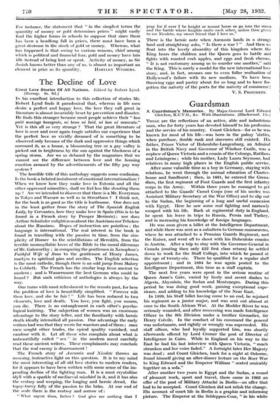The Decline of Love
Great Love Stories Of All Nations. Edited by Robert Lynd. (Harrap. 8s. 6d.)
IN his excellent introduction to this collection of stories Mr. Robert Lynd finds it paradoxical that, whereas in life men desire a perfect and happy love, the love they call great in literature is almost invariably beset by prevention and disaster. He finds this stranger because most people achieve their " bon petit niariage bourgeois, ni beau ni laid, ni bon ni mauvais." Yet is this all so very strange ? That the great literature of love is over and over again tragic satisfies our experience that the perfect love so vividly dreamed of is something to be observed only because of the dark and oppressive things which surround it, as a house, a blossoming tree or a gay valley is picked out in brightness by the sun against the blackness of a spring storm. Are we so debased by the magazines that we cannot see the difference between love and the housing emotion aroused by the advertisements of the fifty pay way system ?
The horrible title of this anthology suggests some confusion. Is the book a belated instalment of emotional internationalism ? When we know how they make love in Estonia and all the other oppressed minorities, shall we feel less like shooting them up ? Are we intended to discover that there is a Mr. Everyman in Tokyo and Warsaw as well as in Streatham ? I think not, for the book is as good as the title is loathsome. One does not in the least gather from the story of The Spanish English Lady, by Cervantes, how they make love in Spain (this is to be found in a French story by Prosper Merimee) ; nor does Arthur Sehnitzler enlighten us about the Austrians nor Tchekov about the Russians. Hopes of instruction are pointless : the language is international. The real interest in the book is found in travelling with the passion in time, from the sim- plicity of Homer to the scintillations of Meredith, from the terrible monosyllabic loves of the Bible to the moral dilenunas of Mr. Galsworthy ; in comparing the gentlemen in Xenophon's Faithful Wife of Susa to the gentlemen of Henry James, martyrs to spiritual pins and needles. The English selection is the most catholic, though there is an odd jump from Malory to Cobbett. The French has the similar leap from ancient to modern ; and is Wassermann the best German who could be found ? But such criticism of anthologies is always by the way.
One turns with most refreshment to the remote past, for here the problem of love is beautifully simplified. " Forever wilt thou love, and she be fair " Life has been reduced to two elements, love and death. You love, you fight, you mourn, you die. There is no entanglement in each other's psycho- logical knitting. The subjection of women was an enormous advantage to the story teller, and the familiarity with heroic death ideally intensified all passion. One advantage the early writers had was that they wrote for warriors and of them ; once men sought other trades, the epical quality vanished, and candour with it. Let all those who complain about what is unbeautiftilly called " sex " in the modern novel carefully read these ancient writers. These complainants may conclude that the real enemy is disarmament !
The French story of Aucassin and Nicolete throws an amusing, instructive light on this question. It is to my mind the most interesting of all old love stories to modern readers, for it appears to have been written with some sense of the im- pending decline of the fighting man. It is a most crystalline
idyll with a sparkle of mediaeval mischief in it, and it has also the ecstasy and weeping, the longing and heroic dread, the topsy-turvy- folly of the passion to the brim. At one end of the scale there is the ecstasy and sorrow of :
" What sayest thou, father ? God give me nothing that I pray for if ever I be knight or mount horse or go into the stress and the battle where knights smite each other, unless thou givest to me Nicolete, my sweet friend that I love so."
There is the heroic note when Aucassin lands in a strange land and straightway asks, " Is there a war ? " And then we float into the lovely absurdity of this kingdom where the King bears the children and the Queen goes to battle and fights with roasted crab apples, and eggs and fresh cheeses. " It is not customary among us to murder one another," said the King. This is surely a model for the new international love story, and, in fact, arouses one to even fuller realization of Hollywood's failure with its new medium. To have been throwing eggs and pastry about for so long and to have for- gotten the naivety of the poets for the naivety of commerce !
V. S. PRITCHETT.








































 Previous page
Previous page